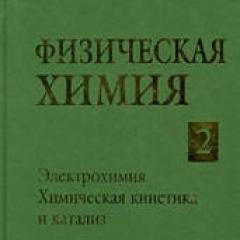Ege English language online tests. Ege in English
Dear colleagues!
And at the same time I will tell their “case history” - how it all began and what we came to, including an analysis of the mistakes made in the exam. I hope my experience will help you in your preparation!
This year, I had two girls taking the exam in English - Anastasia and Irina.
Anastasia
Anastasia came to me a year and a half before the exam with a confident level intermediate. She had been studying with English tutors since elementary school, but she turned to me because she did not feel progress in her classes with the previous teacher.
Anastasia made me happy with the ease of perceiving the language, quickly memorizing new structures and words, but frustrated me with mistakes at the Elementary level. And it would be nice if they were fossilized, that is, permanent. But these very errors behaved like in a resort - they appeared once and disappeared without a trace ...
Trial version the student wrote about 75 points, excellent for someone unfamiliar with the exam format. Therefore, the purpose of the preparation was to teach the girl how to squeeze her good English into the exam format.
And after a year of classes, Anastasia changed her mind about choosing a university and said that now she needs the exam in literature, and not in English. But they decided to pass the exam anyway, since so much effort has already been put in.
The last, pre-exam samples, Anastasia wrote about 90 points, and this was the result that we expected at the exam.
Before the exam, according to her, she was not at all worried and was confident in her answers. But, having received the results, both were disappointed - 78 points!
The table clearly shows how the student wrote the samples and what happened on the exam. The columns indicate minus how many points the student received.
It is especially offensive for grammar with vocabulary and essays. Let's look at essay mistakes according to the criteria for assessing the USE in English:

The theme of the Moscow Region this year is “The best holidays and festivals are those with specific traditions for celebrating”. Yes, tricky. It would be interesting for me to see how the person who invented it would describe it by 14 points, I am especially worried about the solution of the communicative task - none of my students received the maximum for this item.
For decision communicative task(KZ) Anastasia has 2 points out of 3. This means: “some aspects indicated in the assignment are not fully disclosed; there are some violations of the style of speech. Since everything is in order with the style (no abbreviations and informal vocabulary), some aspect is not disclosed.
In my opinion, Anastasia distorted the topic. In the introduction, we see the opposition “old traditions - specific traditions”, which is not entirely true. Rather, it should sound like this: “no particular traditions - specific traditions”, for example March 8th / February 23rd - Halloween / New Year. This incorrect opposition is repeated throughout the essay, because of this, a point was deducted.
Behind text organization(OT) we have 2 points out of 3: “the statement is basically logical, there are some deviations from the plan in the structure of the statement; there are some shortcomings in the use of logical links; there are some shortcomings when dividing the text into paragraphs”. I did not notice any shortcomings when using means of communication, the division into paragraphs is correct, which means we are dealing with a violation of the logic of the statement.
In the 2nd paragraph, where the student's opinion is indicated, the first and second arguments are similar - 1) the old traditions are boring; 2) they cannot surprise tourists.
In the 3rd paragraph, where the opposite point of view should be expressed, we read about the old traditions of the countries, which show the ancient culture of the country. The counterargument in the 4th paragraph states that in such countries it will be more interesting for tourists to participate in specific celebrations in order to understand the uniqueness of the country. It is illogical, because ancient traditions also distinguish one country from another.
Here they could also put a minus for this bundle in the 2nd paragraph: “Personally, in my opinion, …” Although I personally don’t see any crime in it.
Behind vocabulary removed 1 point. “The vocabulary used corresponds to the set communicative task, however, there are some inaccuracies in the use of words (2-3 words), or the vocabulary is limited, but the vocabulary is used correctly.” I don’t know where in this topic with vocabulary it was possible to turn around, so, probably, points were removed for the incorrect use of vocabulary:
celebrate with old traditions/ … are celebrated by old traditions… 1,2 paragraphs our world does not stand on one place, 5 paragraph
On the grammar also minus 1 point - “there are a number of errors that do not make it difficult to understand the text (no more than 4)”.
the old traditions, paragraph 2 (no clarification on which ones)
… are popular with tourists who want to visit a country again and again, paragraph 2 (there is about a specific country)
tradition make any country is different …, 4 paragraph
… the best holidays and festivals are not those which are celebrated ordinary..., paragraph 5 (not that part of speech)
Behind spelling and punctuation also deducted points. “There are a number of spelling and/or punctuation errors, including those that make it slightly difficult to understand the test (no more than 4).”
Spelling: “they long to try something knew“, 2 paragraph
Punctuation:
The others have an opposite opinion ...__ and I can understand this point of view, paragraph 1 (compound sentences without a comma before the union)
… they sing their national songs, do not dance as usual , but make cool tricks ... 2 paragraph (homogeneous members, no comma needed)
As a result, events, which make people surprised…, are the best, paragraph 4 (subjective, not separated by commas)
... events, which are celebrated by specific traditions, paragraph 4 (subjective definitive, not separated by commas)
Here is the essay and its analysis. If you do not agree with me in assessing the essay or in something else, write in the comments!
Irina
Now let's talk about Irina. We studied with her for exactly a year before the exam, she also came to me from another tutor, from classes with whom she did not see any benefit. Before that, I didn’t study the language with teachers, the exam in English was needed for admission to the university. Language level - the beginning of Intermediate, probe wrote 67 points. Gaps constantly popped up in the elementary, like: Are there a vegetarian menu? But unlike Anastasia, these mistakes were already deposited in the subcortex.
During the year, we practically did not touch the vocabulary, the stock of which was enough to write an essay, but tightened up the grammar and pored over the exam format. A school teacher, an USE expert, made a great contribution to the preparation, she shared materials for preparation and suggested points that I did not know. Huge thanks to her for this!
Before the exam itself, the probes showed 85 points, so Irina passed - on the expected 85 points. I was especially pleased with the essay with a difficult topic, which she managed to describe and speaking without errors.
Comparison table:
Let's also break down her essay according to the criteria:
In this work, 1 point is lost on KZ And grammar. I will pay attention only to them, I will not touch errors in other parameters that did not affect the loss of points.
So, KZ. For me personally, the topic is open, the only place where I don’t see logic in giving an example to my statement is the 3rd paragraph with a counterargument: “They consider that unusual celebrations can be dangerous because people do not know what they should do there”. For me, the word dangerous does not stand for “people do not know what they should do there”.
Grammar found 4 errors:
… because ___ unusual way of spending your free time …, paragraph 2 (no article)
Moreover, you can go with your friend which was there earlier ..., paragraph 4 (which instead of who, was instead of has been)
In conclusion, I would state that specific festivals are __ very exciting way of spending your free time, paragraph 5 (no article).
Results
What have I made for myself? conclusions?
FROM Anastasia I didn’t work out the psychology of passing the exam - I had to repeat many times before the exam that she should not relax and be careful not to make mistakes. Perhaps it was her self-confidence that let her down.
This is an example of the fact that a person with a good knowledge of the language (by the end of our classes, Anastasia had a confident Upper-Intermediate) cannot always adjust it to the format of the exam. And the Unified State Examination is a lottery, this year with unpredictable texts, sometimes above the required level, and a tricky essay topic.
FROM Irina everything is logical, she wrote as much as she deserved. Of course, I would like her to get about 90, but given the difficult listening (2 task), reading (3 task) and essay topic, it could be worse. So here we are satisfied.
Here I concluded that the Intermediate level is sufficient to successfully pass the exam, the main thing is to master the format and strategies for solving tasks where there is not enough knowledge to fully understand the text.
This concludes my reflection on the work done. It will be great if you share the results of the exam 2016!
Have a good holiday everyone!
This page contains demonstration versions of the exam in English for 2003 - 2019.
Starting from 2015, USE in English consists of two parts: written and oral, which includes five sections: "listening", "reading", "grammar and vocabulary", "writing" (written part) and "speaking" (oral part).
For the tasks of the first three sections in the demonstration versions, answers are given, and for the tasks of the fourth and fifth sections, evaluation criteria are given.
In comparison with the criteria for evaluating the performance of task 40 of the “Writing” section in the written part of the exam, as well as the wording of task 40, in which the exam participant is offered a choice of two topics of a detailed written statement with elements of reasoning “My opinion”, are specified.
Demonstration versions of the exam in English
Note that demo options are presented in pdf format, and to view them you need to have installed, for example, the freely distributed software package Adobe Reader on your computer.
Changes in the demonstration versions of the exam in English
Demonstration versions of the exam in English for grade 11 for 2004 - 2008 included five sections: "listening", "reading", "grammar and vocabulary", "writing", "speaking". The tasks of the first three sections in the demonstration versions were answered, and for the tasks of the fourth and fifth sections, evaluation criteria were given.
Demonstration versions of the exam in English for grade 11 for 2009 - 2014 already consisted of four sections: "listening", "reading", "grammar and vocabulary", "writing". The tasks of the first three sections in the demonstration versions were given answers, and for the tasks of the fourth section, evaluation criteria were given.
Thus, from demonstration versions of the Unified State Exam 2009 - 2014 the "speaking" section was excluded.
IN 2015 USE in English began to consist of two parts: written and oral. Demonstration version of the written part of the USE 2015 in English Compared to the demo version of the USE in 2014, it had the following differences:
- Numbering assignments was through throughout the variant without letter designations A, B, C.
- Was the form of recording the answer in tasks with a choice of answers has been changed: the answer has become necessary to write down the number with the number of the correct answer (and not mark with a cross).
- Listening tasks A1-A7 demo version in 2014 were transformed into task 2 written part of the 2015 demo.
IN 2015 in USE in English again returned section "speaking", now in the form oral part of the exam.
IN demo versions of the USE 2016 - 2018 in English compared with demo 2015 in Englishthere were no significant changes: the wording of the tasks of the oral part of the exam and the criteria for their evaluation were clarified.
IN demo version of the USE 2019 in English compared with demo 2018 in English the criteria for evaluating the performance of task 40 of the “Writing” section in the written part of the exam were clarified, as well as the wording of task 40, in which the exam participant was offered a choice of two topics of a detailed written statement with elements of reasoning “My opinion”.
On our website you can also get acquainted with the trained teachers of our training center "Resolventa" educational materials for preparing for the exam in mathematics.
For students in grades 10 and 11 who want to prepare well and pass USE in mathematics or Russian language for a high score, the training center "Resolventa" conducts
We also have organized for schoolchildren
The exam, in any language, has always raised many questions. But the exam in English does not cause so much negativity. It's just that most schoolchildren studied from textbooks, in which a huge number of tasks were built in the test version. Since schoolchildren are accustomed to such tasks, the exam is psychologically comfortable. But there are still many questions for future employers. Are tests able to show the level of language proficiency. After all, writing is one thing, and pronunciation and oral speech skills are another. But the rules are the same for all subjects and the format of the final exam is just that, and you need to prepare for it.
Types of preparation for the exam in English
Since oral skills will not help you pass the exam, then classes with a tutor can be wasted. If the classes consist mainly of oral communication, then they will not help prepare for the exam. The same is true with English courses. There is a huge amount of online on the Internet. So basically they improve their oral skills, then the results of the exam from them will not get better. In this regard, the question arises: what is the best way to cook to USE in English?
How to prepare for the exam in English?
The first step is to identify gaps in your knowledge. After that, start to eliminate them. The best way to see your problems is to go through trial online tests of the Unified State Examination in English. On the educational portal Uchistut.ru, you can take trial tests of the Unified State Examination in English an unlimited number of times. During the test, your time is not limited, and you can open the textbook to refresh your knowledge. To pass the tests, you do not need to register or send SMS from your phone. After you have identified topics in which you do not feel confident, you can turn to specialists or independently pull up the material. But self-study threatens with mistakes that can cost you dearly on the exam. Therefore, it is worth choosing such English courses that will focus on knowledge gaps and help prepare for the exam. Preparatory courses are best for


